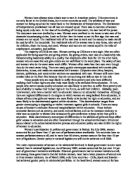The exploration of television brings to light that of moral behaviour. A large proportion of television audiences consist of teenagers, these are extremely susceptible to what is seen as their moral values are currently in development (Banerjee, 2005). Humans in the developmental process learn by imitation, normally in the form of a visual aid by mimicking actions by others. One such study was made by Albert Bandura by use of the Bobo doll in 1961. This study was compiled of children who were shown acts of verbal and physical violence inflicted on an inflatable Bobo doll. Although, the results were deemed inconclusive there was a distinct relationship between the acts of violence viewed to the actual acts of aggression the children performed. The developmental formation of a young person’s mentality is directly linked to a causal effect of imitation (Bandura, 1961). Morality can therefore be learned or imitated from acts of violence and various stereotyping promoted by television viewing. Televisions impact on the morality of younger individuals can affect the future of society on a negative plain. In contrast, most influence that children experience in the supplemental development of moral values results from family, friends, religion or even school (Morrison, 1997). Parents and teachers who are incapable of setting strict moral ethics can have an egregious effect on children; with their social environment, friends and state of living being contributory factors.
Cultural content in television has little or no sustenance. This is a strong statement with compelling evidence to support this view. Television is a powerful tool for delivering information to the viewer in small concentrated doses; this causes fluctuation in the absorption rate and gives people very narrow-minded views of cultural diversity. Most television programs have the purpose of entertaining the viewer only; which extends to the multitude of films for the deliverance of commercial intent with little actual cultural value. From a religious perspective, television is seen as a temple of mass production, creating shallow values and stereotypes that influence modern society. Television is a form of stimulus only, with the need to experience feelings and emotions in the content consumed, causing an imbalance in serotonin levels. As stated by Dr Dimitri Christakis, ‘television can cause the developing mind to experience unnatural levels of stimulation’ (The Elephant in the living room, 2007). This “Hollywood” model of producing programming for entertainment purposes can only produce a society of negative values and views, losing regional traditions and diversity for ratings. Contrary to this, there are now more scientific and cultural programs available since the introduction of digital television. People have access to channels that now cater for almost any interest, giving new educational opportunities for society. Information in this medium encourages the individual to participate in society, keeping them informed with current affairs and politics. Certain programs allow viewers to establish closer links between politicians and electors, resulting in a more unified society. Self-expression and more opportunities are fashioned through the medium of television allowing a more “open” society, allowing the viewer to express their own thoughts and ideas. Moreover, with the introduction of interactive digital viewing this ensues opportunities for society in the future.
A contradictory argument, but also a valid point is that television viewing constricts time resulting in an unfulfilled life. Most recreational time is spent sitting in front of the television; data compiled has concluded that a correlation exists between television and health concerns. Childhood obesity has increased in the UK by seventeen percent in the last ten years as a result of more programs directly focused on the youth of society (Times online, 2006). The average British child is spending thirty-six hours watching television; while only spending thirty hours in school. Studies have shown that most children between the ages of two and fifteen have a television in their room, which remains unmonitored by guardians, allowing questionable content to be viewed by impressionable minds (Mail online, 2006). In addition, research undertaken has shown an increase in autism over the last thirty years with a relationship to television; with ninety thousand cases recorded in Britain alone. The lead researcher Michael Warden has determined that of the research conducted although not conclusive this is a very compelling case for the effect of television on society. Increased programming in which caters for all results in reduced recreational time. This includes social interaction, discouraging exercise and improving the quality of “real” life by narrowing societies view on the world. However, as in most cases this is the conscientious choice of an individual; they are able to choose how to spend their recreational time. As previously mentioned, children learn by imitation and the blame should be with the parents not with television. Social environment and lifestyle determines the arrangement television has on the recreational time of an individual, not the opposite (Telegraph, 2008). Although research has shown that eleven to fifteen year olds are spending fifty-five percent of their waking life in front of television, this research does not correlate to this medium only. Many children are now spending less time than they were ten years ago watching television. With the introduction of a “techno-junkie” society; many children are now spending more time pursuing interests on the internet, iPods and texting. In many cases this form of communication is how the youth of society conform to one another, sometimes while in the same room.
Finally, television has been determined in part to be the cause of the well known psychological problem of depression. The increased popularity of television has resulted in the increase of this phenomenon, as indicated in many scientific conclusions on this subject. This is resulted from the broadcasting of violence, aggression, crimes and wars not only in films but depicted on the daily news. This indication to current events can trigger emotions and effect how the individual looks at society. As perceptions of the world come to conform to the depictions they see on TV, they become more passive, more anxious, and more fearful. Gerbner calls this the "Mean World Syndrome." This “fear” can result in a breakdown in society, as people become too afraid to step outside into a world of nothing but horror and despair (Gerbner, 1998). A study conducted on television and urban lighting concluded that the lighting can have a distinct causal effect with depression (Behavioural Brain Research, 2009). The researchers stated, ‘......that exposure to unnatural
lighting can induce significant changes in affect (mood)....’ Movies and television programs therefore, that emanates dark imagery support scientific research that this encourages psychological tension, pessimism and negative emotions. Consequently, the research and results are inconclusive with no definitive association between television and depression can be found that is beyond reproach. As regards to depiction of violence in the news, people have the right to be informed of the world in which they live. This should include the problems that nations face through visceral images that represent the reality of events honestly, being the first step to solving them. Television programmes can be a source for entertainment and positive emotional reactions. Certain programs allow laughter and happiness to be expelled as a family, an individual or with friends. Many positive emotions can be shared with a variety of genres readily available to watch, this can include; television shows, comedies, musical channels and the list is virtually endless. This form of relaxation enables society to experience positive emotions, even if this is possibly only in the short term to assist in taking their minds off their troubles.
To conclude, television has varying amounts of evidence in support of it having an influence on society. From the evidence provided it shows that it seems to have an almost overwhelming case that this is a malign influence. However, none of the evidence is universally accepted and research has proven only that more research is needed to give a more definitive answer. This inconclusive evidence is the reason that television is commissioned to still broadcast material. Although, information is limited by the production companies, it is proven to be a resourceful tool for education. Television can unite families together in laughter and produce a topic for discussion, while at the same time bringing a nation together for a common interest. The educational benefits, social benefits and financial gain is the reason why television has not been removed completely, regardless of the controversial arguments against the usefulness of this medium. Additionally, this brings to question the ethics behind television broadcasting and content. Thus, bringing to light the question; is this influence on society a method of transmitting the thoughts and ideas of the leaders of the country? Or, is this a form of control for the masses, to create a susceptible society?
Bibliography
All Academic Research (n.d.) Television and Children's Moral Reasoning: Development of a Standardized Measure of Moral Reasoning on Interpersonal Violence. Available from: http://www.allacademic.com/: meta/p_mla_apa_research_citation/2/3/3/4/1/p233419_index.html, accessed 29 December 2009
Banerjee, R. (2005) Moral behaviour. Available from: http://www.open2.net/
healtheducation/family_childdevelopment/morality.html, accessed 29 December 2009
BBC Home (2007) Inside Out-North East: Murder Of James Bulger. Available from: http://www.bbc.co.uk/insideout/northeast/series11/
week6_cctv.shtml, accessed 28 December 2009
Christakis, D. and Zimmerman, F. (2006) The Elephant in the living room: Make television work for your kids. New York: Rodale Books
Collins Dictionary (n.d.) Definition of television. Available from: http://
www.collinslanguage.com/results.aspx, accessed 08 December 2009
Gunter, B. and McAleer, J. (1997) Children and television. 2nd ed., London: Routledge
Highfield, R. (2007) Science: Can we stop anti-social behaviour. The Daily Telegraph, 27 November, pp.7-8
Literacy Trust (n.d.) Television, film, radio and literacy. Available from:
http://www.literacytrust.org.uk/database/tv.html, accessed 14 December 2009
Maguire, M., Morgan, R. and Reiner, R. (2002) The Oxford Handbook of Criminology. 3rd ed., Oxford: Oxford University Press
Media Awareness (n.d.) Research on the effects of media violence. Available from: http://www.media-awareness.ca/english/issues/violence/ effects_media_violence.cfm, accessed 14 December 2009
Morrison, N.K. and Severino, S.K. (1997). Moral values: development and gender influences. The Journal of the American Academy of Psychoanalysis, 25(2), pp.255-27
NationalHealthService (2009) Child depression and television. Available from: http://www.nhs.uk/news/2009/10october/pages/tv-streetlight-depression-research-news.aspx, accessed 14 December 2009
Putwain, D. and Sammons, A. (2002) Psychology and Crime. East Sussex: Routledge
S-cool (n.d.) Media influences on anti-social behaviour. Available from:
http://www.s-cool.co.uk/alevel/psychology/pro-and-anti-social-behaviour/media-influences-on-pro-and-anti-social-behaviour.html, accessed 28 December 2009
Seattle children’s (2007) Harnessing technology for the benefit of children. Available from: http://www.seattlechildrens.org/about/stories/harnessing-technology-for-the-benefit-of-children/, accessed 16 December 2009
Sims, P. (2009) Families so busy the only time they spend together is watching TV. The Daily Mail, 13 April, pp.4-5
(n.d.) The Bobo Doll Experiment. Available from: http://www.experiment-resources.com/bobo-doll-experiment.html, accessed 16 December 2009
Sweney, M. (2009) TV ad viewing ‘up 30% since 2000’. Available from:
http://www.Guardian.Co.Uk/Media/2009/Dec/24/Tv-Ad-Viewing-Up, accessed 28 December 2009
The Times Online (2009) Child autism linked to hours spent watching television. Available from: http://www.timesonline.co.uk /tol/news/uk/article , accessed 14 December 2009







